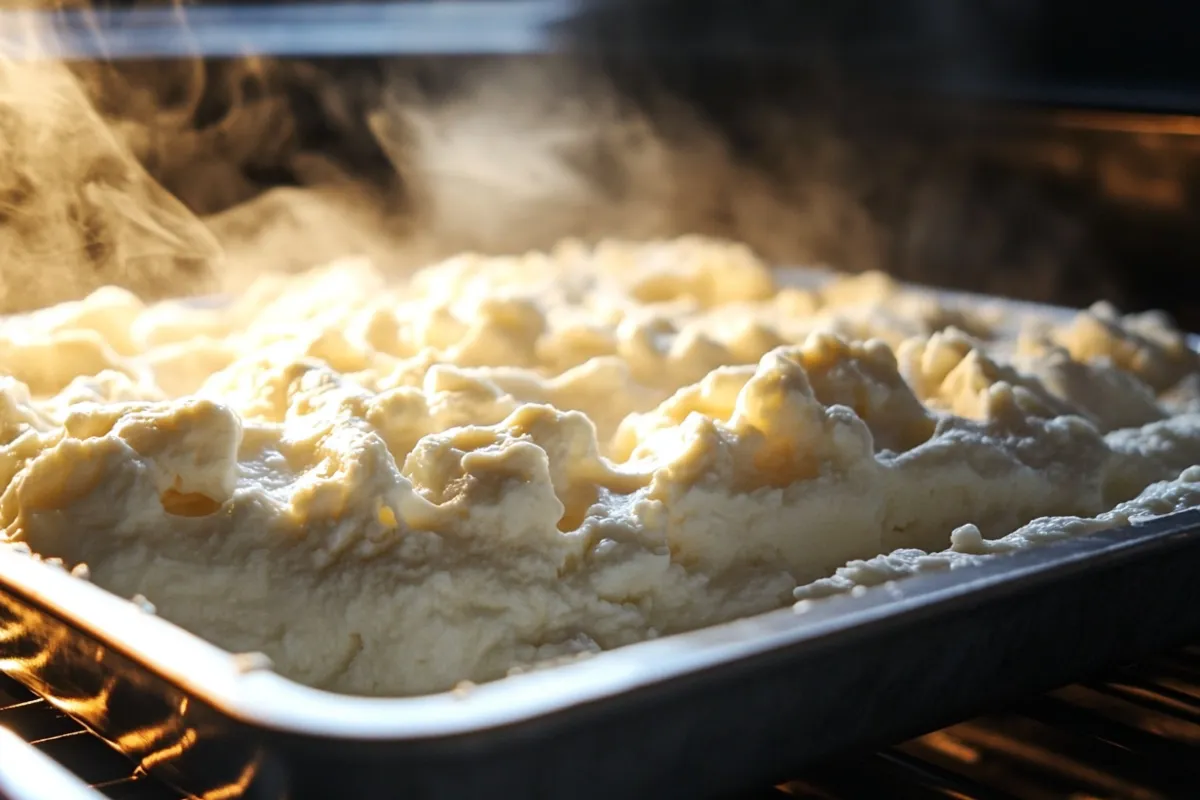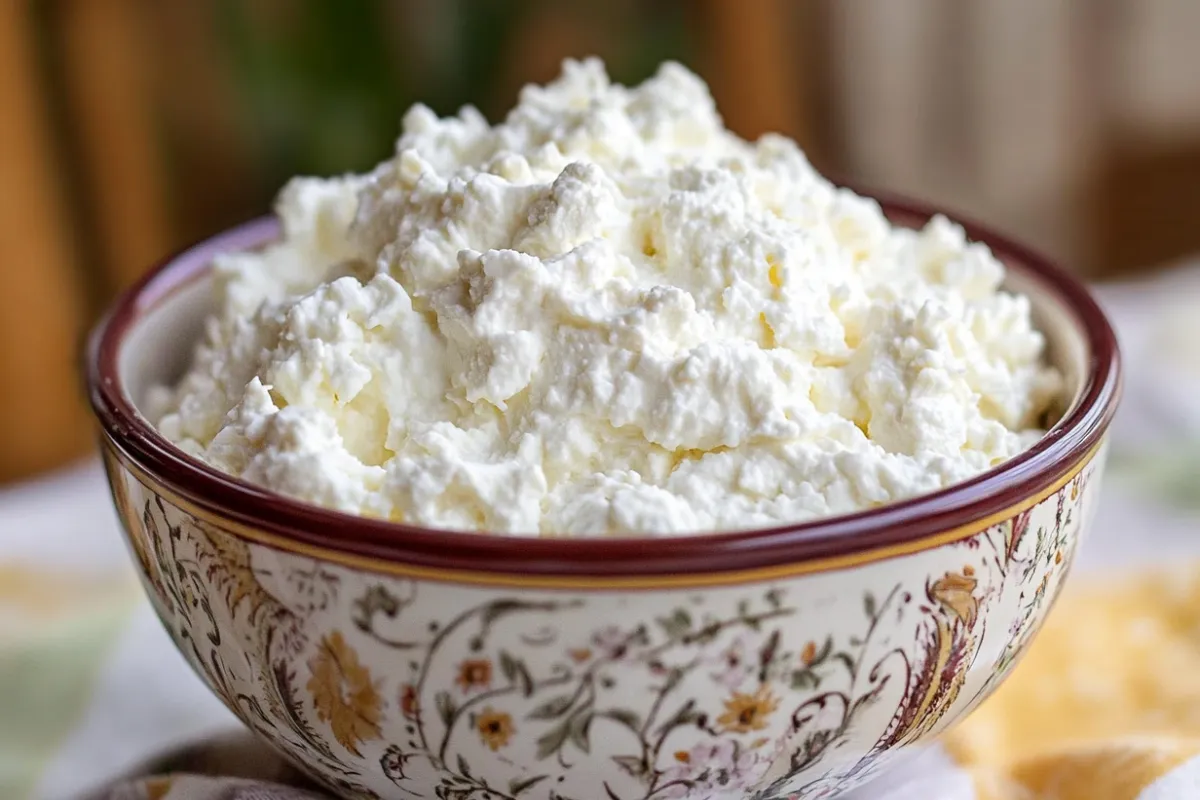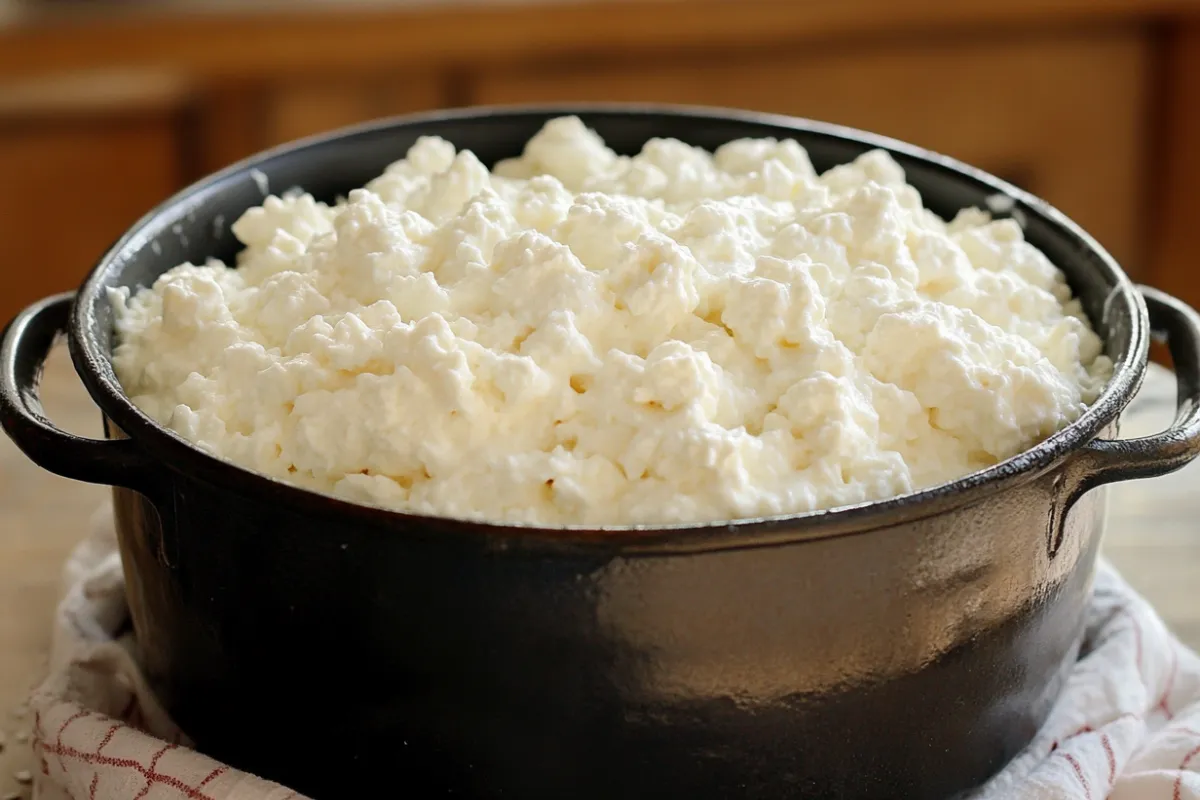Cottage cheese is a go-to choice for many looking to add a low-fat, high-protein ingredient to their diet. But a common question arises: Does cottage cheese lose protein when heated? Whether it’s in smoothies, salads, or baked dishes, people want to know if cooking affects the protein content. In this article, we’ll explore how heating impacts cottage cheese and whether it still offers the same nutritional value after cooking.

What is Protein Denaturation?
To understand if heating cottage cheese affects its protein, we need to first understand the process of protein denaturation. When a protein is exposed to heat, its structure changes. This process is called denaturation, and it occurs in most proteins when subjected to high temperatures. However, while the structure of the protein may change, this does not necessarily mean that the protein content itself is lost.
Proteins are made up of amino acids, and heat can alter the bonds between these amino acids, causing the protein to unfold. The unfolding process changes the protein’s shape, but it does not remove the amino acids, which are the building blocks of protein. The human body breaks down denatured proteins into these amino acids during digestion, meaning that the protein value remains intact.
For a more scientific look at how protein in dairy products behaves under heat, you can check How Heat Affects Protein in Dairy.
What is Cottage Cheese?
Cottage cheese is a special dairy product that people have loved for centuries. It’s made by curdling milk and then separating the solid curds from the liquid whey. This makes a soft, creamy cheese with a mild taste.
It’s known for its cottage cheese nutrition. It’s packed with protein, calcium, and other important nutrients.
Nutritional Profile of Cottage Cheese
Cottage cheese is very nutritious. A cup of it usually has 12-24 grams of protein, depending on the types of cottage cheese. It also has lots of calcium, phosphorus, and other minerals. These are good for your bones and overall health.
Types of Cottage Cheese
There are many types of cottage cheese out there. You can find low-fat, non-fat, large-curd, and small-curd versions. Each type has its own texture, taste, and nutritional content.
Does Cottage Cheese Lose Protein When Heated?
Many wonder if heating cottage cheese reduces its protein. *Protein denaturation*, caused by heat, changes protein structure. This is a key concern.
Cottage cheese is packed with high-quality *protein*. It’s a favorite for those looking to increase their protein. But, how does heat affect its *protein* content?
Since cottage cheese is used in many recipes, knowing how heat impacts its *protein* is vital. It helps keep this dairy product nutritious. Let’s dive into the science of *protein denaturation* and its effects on cottage cheese.
For more ideas on incorporating cottage cheese into your meals, check out Delicious and Healthy Cottage Cheese Recipes.
The Science of Protein Denaturation
To understand how heat affects dairy like cottage cheese, we need to explore protein denaturation. This is when a protein’s shape changes, which can alter its function and stability.
What is Protein Denaturation?
Proteins are made of amino acids, folded into shapes that give them unique properties. Protein denaturation happens when these shapes change, often due to heat, pH changes, or chemicals.
When cottage cheese is heated, the heat effects on dairy can cause proteins to unfold. This change can affect the food’s texture, taste, and nutritional value. The denatured proteins may not work the same way as they did before.
Factors Affecting Protein Denaturation in Cottage Cheese
The protein denaturation in cottage cheese is affected by temperature and acidity. Knowing how these factors change the protein content and structure of cottage cheese is key. It helps keep its nutritional value when heated.
Temperature
Heat is a main cause of protein denaturation in dairy like cottage cheese. When it gets hotter, the proteins start to break down. This makes the protein structure change, affecting the texture, taste, and quality of the cheese.
Acidity
The acidity of cottage cheese also impacts protein denaturation. The pH level changes how proteins behave, making them more or less prone to changes. Adding ingredients like lemon juice or vinegar can control the protein denaturation during heating.
Effects of Heating on Cottage Cheese Protein
When cottage cheese is heated, its proteins change a lot. The process of protein denaturation is key to understanding these changes.
Protein denaturation happens when proteins lose their shape at high temperatures. This can make the protein less functional and possibly reduce its nutritional value. The heat effects on cottage cheese protein vary based on how hot it gets and for how long.
Heating cottage cheese can cause proteins to unfold, clump together, and even break down. This can lower the protein content and change its properties. How much this happens depends on the temperature, acidity, and how long it’s heated.
Knowing how heat affects cottage cheese protein is important for keeping it nutritious. By understanding protein denaturation, people can choose the best ways to cook cottage cheese. This helps keep its protein content high and its nutritional benefits intact.

Cooking with Cottage Cheese
Cottage cheese is a versatile dairy product great for many cooking and baking recipes. It adds flavor and texture, and boosts protein content. This makes it a healthy choice for those watching their diet.
Baking with Cottage Cheese
Using cottage cheese in baking is very popular. Its creamy texture and mild taste are perfect for replacing cream cheese or sour cream. It’s great in cheesecakes, pancakes, and muffins.
It also keeps the protein level high in these treats. This ensures they are more nutritious.
When baking, the type of cottage cheese matters. Low-fat or non-fat types might need extra moisture or binders. Trying different cottage cheese types can lead to tasty and unique baked goods.
Maximizing Protein Retention in Cottage Cheese
For those looking to keep cottage cheese’s protein, knowing how cooking affects it is key. *Protein retention in dairy products* can change based on temperature and acidity. Using smart cooking methods can help keep cottage cheese’s nutritional value.
When cooking cottage cheese, use gentle heat. High temperatures for too long can damage the protein and nutrients. Instead, choose lower-temperature methods like baking or simmering. This way, you can heat the cheese without losing much protein.
Another good idea is to use cottage cheese in recipes with little heat. Adding it to cold dishes like dips, smoothies, or no-bake desserts keeps its protein and nutrients. By choosing gentle or no heat, you can enjoy cottage cheese’s protein benefits in your cooking.
High-Protein Foods When Cooked
Cottage cheese is a favorite for its high protein, but it’s not the only one. Many foods rich in protein change when cooked. Knowing how these high-protein foods when cooked behave is key to getting the most nutrition.
When it comes to protein retention in dairy, cottage cheese isn’t alone. Milk, yogurt, and cheese also lose protein when heated. This happens because the proteins change shape, making them less available to our bodies.
The amount of protein lost can differ based on the food and cooking method. For example, grilled meats might keep more protein than boiled ones. Even plant-based foods like legumes and nuts can see changes in protein content depending on how they’re cooked.
Grasping these details about high-protein foods when cooked helps us make better food choices. It ensures our meals are not only tasty but also packed with nutrients. By understanding how heat affects different proteins, we can enjoy our food while getting the most nutritional benefits.
Cottage Cheese Nutrition: Heated vs. Unheated
Many wonder if heating cottage cheese changes its protein content. The truth is, heating can slightly alter its nutritional profile. Whether it’s heated or unheated, cottage cheese is a great source of protein.
Unheated cottage cheese keeps all its protein, making it a top choice for protein lovers. Heating it can reduce protein slightly, but not by much. So, cottage cheese is still a great option for those looking for protein in their diet.
Heating or not, cottage cheese keeps most of its nutrients. It’s full of vitamins, minerals, and probiotics. These are key for a healthy diet. The choice between heated and unheated cottage cheese depends on what you like and how you plan to use it.

FAQ
Does cottage cheese lose protein when heated?
Yes, cottage cheese can lose some protein when heated. This happens because heat changes the protein’s structure. The amount lost depends on the heat, how long it’s heated, and the cottage cheese’s acidity.
What is the nutritional profile of cottage cheese?
Cottage cheese is packed with protein, about 12-24 grams per cup. It also has lots of calcium, phosphorus, and other nutrients. You can find it in different fat levels, from low to full-fat.
What are the different types of cottage cheese?
There are many types of cottage cheese. You can find small-curd, large-curd, low-fat, non-fat, and flavored ones. The main differences are in curd size, fat content, and added flavors.
What is protein denaturation, and how does it affect cottage cheese?
Protein denaturation changes a protein’s structure. When cottage cheese heats up, its proteins can denature. This can cause a loss of protein.
What factors affect protein denaturation in cottage cheese?
Several things can affect protein denaturation in cottage cheese. Temperature and acidity are key. Higher heat and longer heating times increase denaturation. The cottage cheese’s acidity also plays a role.
How does heating affect the protein content of cottage cheese?
Heating cottage cheese can change its protein structure. This can lead to some protein loss. The exact effect depends on the heat, how long it’s heated, and other factors.
Can I bake with cottage cheese and still retain its protein?
Yes, you can bake with cottage cheese and keep most of its protein. Just use lower temperatures and shorter times to reduce protein loss. Adding cottage cheese to baked goods is a great way to boost protein and nutrients.
How can I maximize protein retention when cooking with cottage cheese?
To keep more protein in cottage cheese when cooking, try these tips: – Cook at temperatures under 350°F (175°C) – Heat for shorter times – Add cottage cheese late in cooking – Use higher-acid cottage cheese to stabilize proteins – Avoid long simmering or boiling
How does the protein content of cottage cheese compare to other high-protein foods when cooked?
Cottage cheese isn’t the only high-protein food affected by heat. Foods like eggs, meat, and fish also lose protein when cooked at high temperatures. The impact varies by food and cooking method.
What are the key differences in the nutritional profile of heated vs. unheated cottage cheese?
Heating cottage cheese slightly reduces its protein. But it still offers lots of protein, calcium, and other nutrients. The main difference is a bit less protein in the heated version.
Conclusion: Does Cottage Cheese Lose Protein When Heated?
The answer to does cottage cheese lose protein when heated is no. While heating cottage cheese may denature its proteins, this doesn’t mean the protein content is lost. In fact, denatured proteins are easier for the body to digest, meaning you can still enjoy all the protein benefits of cottage cheese even after it’s cooked. Whether you use it in lasagna, casseroles, or soups, cottage cheese remains a nutritious, high-protein ingredient that holds its value when heated.
For more tips on cooking with dairy products and understanding how they react to heat, check out Will Cheese Melt in the Oven?.

